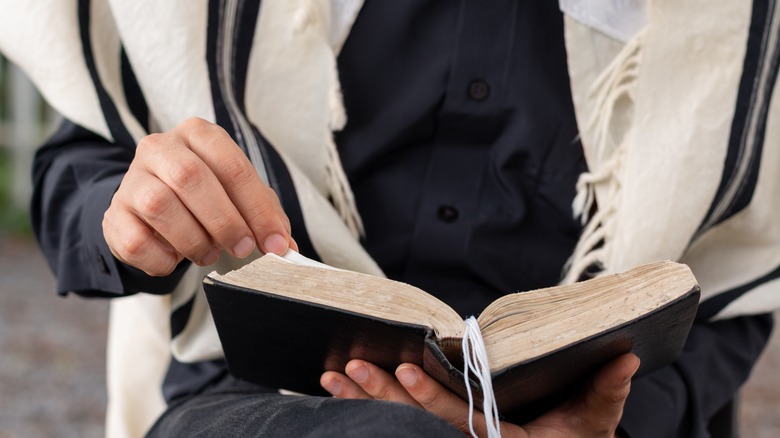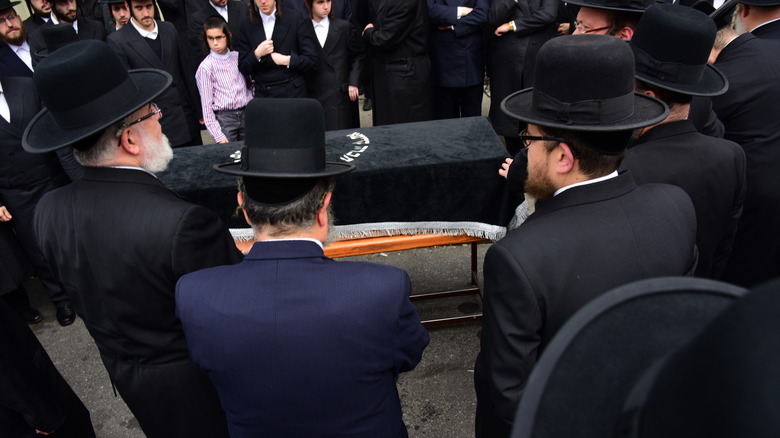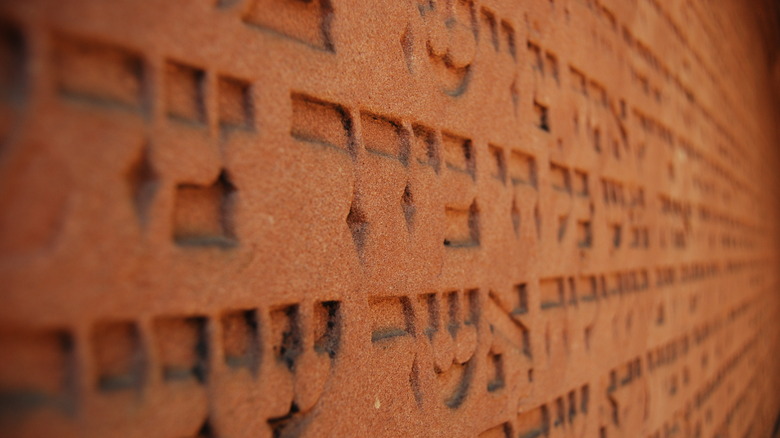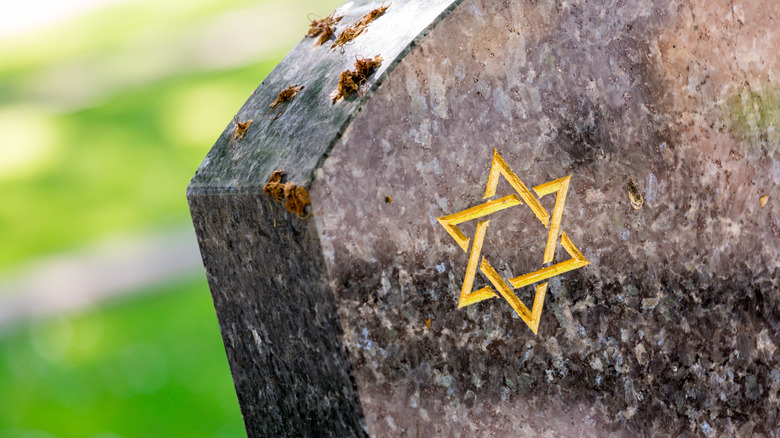Why You'll Rarely Hear The Phrase 'Rest In Peace' In Judaism
Before we start to examine attitudes toward death practices in ancient religions, let's start with an unlikely person: Keanu Reeves. Back in 2019 Reeves was interviewed on "The Late Show with Stephen Colbert" (on YouTube) when Colbert asked Reeves one of humanity's most eternal questions: "What do you think happens when we die?" The interview until then had been light, and the audience laughed at the question. After all, it's Mr. "Whoa" himself, right? Reeves simply relied, "I know that the ones who love us will miss us." Cue the tissues, clutch your chest, and admit it: You've never heard a better, clearer, more touching answer to that question.
At risk of throwing a curveball on this tale and causing a few Jewish eyebrows to raise, this answer isn't way, way different from Judaism's ultimate take on life after death. But bear in mind, when we talk about Judaism, we're not talking about any one tradition: What folks did back in Moses' day, what they do in Brooklyn, New York, or what happens within eyeshot of the Wailing Wall in Jerusalem. We mean generally. Moment Mag highlights a host of discussions about differing Jewish beliefs and practices regarding death, and in the end, as the article quotes, "As they say: two Jews, three afterlives."
Universally, however, Judaism eschews a focus on life after death for a focus on life. Resting in peace is wonderful. But the question begs: What now of the living?
Sitting shiva
A brief overview of Judaism's three biggest denominations — Reform, Conservative, and Orthodox — reveals where they overlap regarding death rites. Reform is the most secular of the three and also the most recently established. It began in 18th-century Germany as an attempt to reconcile more traditional Judaism with an evolving, humanist world (via the Jewish Virtual Library). Conservative Judaism, by contrast, adheres more strictly to high-level traditions like kosher food, disallowing rabbis to officiate at interfaith weddings, and so forth (via My Jewish Learning). Orthodox Jews are the strictest of the three, and do their best to follow the precise letter of God's law laid out in the Torah (via another article at My Jewish Learning).
All three denominations, and the rest in between, "sit shiva" (pronounced with a short "i") when a loved one dies. Shiva is a seven-day mourning period following the death of a loved one. The dead are usually buried in a coffin, not cremated, because Jewish law ("Halachah") necessitates being buried in the Earth (via Chabad). After the funeral, which is often simple and involves reciting prayers such as the Bible's Psalm 23, family members retire home to mourn for a week (also via Chabad). They follow various rituals like hand-washing, keeping doors unlocked, and sitting near the floor, while loved ones can come and pay respects anytime except during the Sabbath (via My Jewish Learning and Reform Judaism). For up to a year after the death, loved ones recite the Kaddish, the "Mourner's Prayer" (via Shiva).
What is written in fire
From here, the Kaddish provides a good place to learn more about Judaism's view of death. The Kaddish honors God and His plan, praises His creation, and wishes peace in Israel and the world (via Shiva). One thing you'll notice: There's no talk of death, the afterlife, or anything theoretical, really. Judaism, by and large, is a supremely practical faith.
Another article on Shiva talks about the purpose of mourning. More than anything else, death rites exist for the sense of community and resolving grief through routine. The dead are gone, there's no way to intervene on their behalf, or glean how God deals with them. This could sound a bit harsh, like saying "get over it," but it also honors one of humanity's most critical abilities: to heal.
This is a key point, because the phrase "rest in peace" implies lots of things about the afterlife. In a Christian sense, "rest in peace" basically means, "I hope you are at peace in heaven." It implies that the dead are conscious, in a way, and aware of whether or not they are experiencing a state of rest on one hand, or strife on the other. As My Jewish Learning explains, canonical Jewish texts are famously ambiguous on life after death. There is no strict, universally-accepted concept of a Christian-type heaven and hell, or any related visions of the end of the world, a future paradise with God, and the like. It's more important to deal with now.
Remembering the dead
All that being understood, saying "rest in peace" isn't necessarily incompatible with Judaism. As the Jewish Theological Seminary explains, there are plenty of precedents in Jewish texts that illustrate that it's totally fine to talk about peace — shalom — in a variety of life contexts. Genesis 37:4, for instance, describes a family conflict centered around Joseph that made saying "l'shalom" (said when saying goodbye) in the house difficult.
Rather than saying "rest in peace," though, Rabbi Julie Zupan on Reform Judaism describes a variety of more traditionally Jewish phrases to say when speaking of the dead. "Zichrona livracha" (feminine) and "zichrono livracha" (masculine) mean, "May their memory be for a blessing." "Aleha hashalom" (feminine) and "hashalom alav" (masculine) mean, "May peace be upon them." "Baruch dayan ha'emet," commonly said shortly after someone dies, means "Blessed is the Judge of Truth." And if you're visiting a family that is sitting shiva, you can say (it's a long one), "Hamakom yenakhem etekhem betokh shaar avelay tziyon viyrushalayim," which means, "May God comfort you among the other mourners of Zion and Jerusalem" (via Chabad).
The closest to "rest in peace" we have in Judaism comes at the end of a couple of different prayers, the El Maleh Rachamim and Yizkor: "vatanuach b'shalom" (feminine) or "vayanuach b'shalom" (masculine). The "b'shalom" is important here, rather than "l'shalom," because as the North Western Reform Synagogue says, it implies finality. It should be used if you never expect to see someone again.



